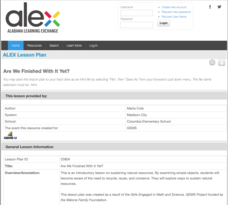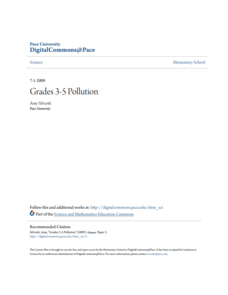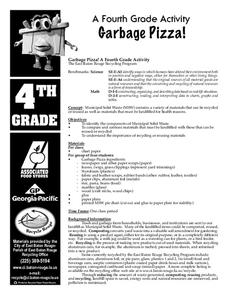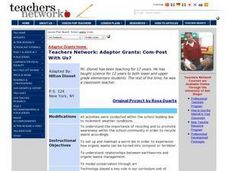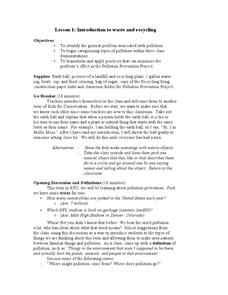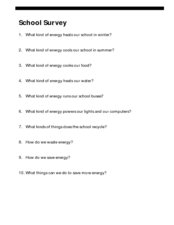Alabama Learning Exchange
Are We Finished with It Yet?
Learners recognize the importance of natural resources and that we need to conserve, reuse and recycle them. In this conserving natural resources lesson, students are given one object and must create something with it. Young scholars...
Curated OER
Water: Our Most Important Beverage
Third graders complete a KWL chart on what they already know about water and what they want to know. As a class, they participate in an activity in which they discover the amount of drinkable water on Earth and are introduced to the...
Curated OER
Recycling!
The students recall events from Dr. Seuss' story The Lorax and make connections to environmental issues affecting their lives. They are expected to reflect on the facts of the story and respond verbally stating the inferences they made...
Pace University
Pollution
Over the course of 10 days, scholars take a pre-assessment to place them in one of three leveled groups. Whole-class and in small groups, pupils take part in read-alouds, field trips, hands-on activities, and complete learning contracts...
Curated OER
Garbage Pizza
Fourth graders explore the concept of waste management. In this recycling lesson, 4th graders identify materials that must be landfilled as well as items that may be recycled or reused.
Curated OER
Honey, I Shrunk the Lids!
Students discover the lightweighting concept used by manufacturers. In this environmental education lesson, students research the reduction of the amount of aluminum used in cans. Students wrap the lesson up by writing a newspaper...
Curated OER
Earth Day
Learners practice addition and estimation. They use tens models to solve the problems related to grocery bags and Earth Day. Afterwards, they complete an activity sheet and draw a large grocery bag decorated with Earth Day messages.
Captain Planet Foundation
P is for Poppies
Explore the way local farming and rationing helped the war effort in World War I with a lesson plan on gardening. After learning about trench warfare, reading "In Flanders' Field" by John McCrae, and studying poppies, kids discuss...
American Museum of Natural History
Ask a Scientist About Our Environment
Let's ask an expert! Scientists at the American Museum of Natural History field questions about the environment in an interactive resource. Question topics range from global warming and conservation to endangered species and habitats.
Curated OER
Com-Post With Us?
Students discuss the importance of reducing, recycling and reusing materials to help the environment. As a class, they create a worm bin and observe how it turns material in to compost. They use the internet to research the...
Curated OER
Save the Earth: It's Everyone's Home
Students explore how recycling helps save trees and protect the environment. In this environmental concern lesson, students color a handout of animals that live in forests. Students discuss how recycling paper can save trees and set up...
Curated OER
Making Tough Decisions about the Energy We Use
Student examine ways we use and conserve energy. They discover the choices one makes concerning excessive energy use.
Curated OER
School Survey
For this school energy worksheet, students read the questions about school's energy sources, the way school's can recycle, and how energy can be wasted or saved in schools.
Curated OER
Home Survey: What Kind of Energy?
In this environmental awareness learning exercise, students become aware of home energy conservation and recycling. Students answer 10 short essay questions about the energy used in daily life.
Curated OER
Going Green School Campaign
Learners explore ways to make their school's interior and exterior environmentally 'green.' In this environmental concern instructional activity, students work in groups to examine their school's interior and exteriors to make them...
Curated OER
Thinking about Energy
Students examine their understandings about energy concepts by completing an online survey. Students participate in a class discussion about their uses of resources and the differences between perpetual, renewable, and nonrenewable...
Curated OER
Gettysburg Rocks Recycle to Win
Eighth graders use a geologic cross section to study the rock cycle of the Gettysburg battlefield. In this rock cycle lesson plan, 8th graders connect the rock cycle and continental rifting.
Curated OER
Conservation in Costa Rica
Students brainstorm what they do that requires land use and use a worksheet to calculate their footprint (the total area of land and water required to produce all the resources they consume). They then compare their footprints to each...
Curated OER
Our Landfill Future
Students use the internet to research articles on garbage, landfills and the environment. In groups, they identify ways to conserve or recycle materials found in landfills and determine the future of a local landfill. They share their...
California Academy of Science
Energy: A Day in My Life
If only we could harness the energy of fifth graders, our energy problems would be over! The class discusses where different forms of energy come from and how we use them. They complete a chart of the activities that they do daily...
Curated OER
Our Space Station Earth
Students discover ways to preserve the Earth's resources. In this natural resources lesson, students investigate how many gallons of water the average American uses per day and then total their estimated usage. Students discuss the...
Curated OER
Stamp It!
Students explore environmental issues through art. In this stamp lesson, students use preconsumer waste paper and colored pencils to create rubber stamp designs. This is an environmentally safe lesson.
Curated OER
We're Environmentally Friendly
Fourth graders examine written works dealing with environmental issues and resolutions during a 5 week unit. They create posters, poems, and rap songs demonstrating authorship and knowledge of the environment.
Curated OER
Trash Flash Through Time
Young scholars describe ways in which solid waste was disposed in the past and the present. They survey an older citizen about his/her solid waste disposal methods. They discover solid waste practices from long ago.


